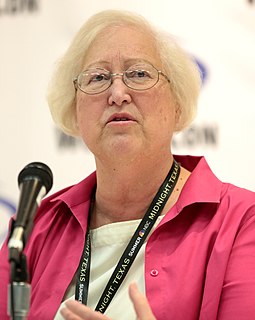A Quote by Edward Abbey
The author: an imaginary person who writes real books.
Related Quotes
Even the very youngest children already are perfectly able to discriminate between the imaginary and the real, whether in books or movies or in their own pretend play. Children with the most elaborate and beloved imaginary friends will gently remind overenthusiastic adults that these companions are, after all, just pretend.
For any artistic person who creates imaginary people, the art is like inhabiting the life and mind of a seven-year-old child with imaginary friends and imaginary events and imaginary grace and imaginary tragedy. Within that alternate universe, the characters do have quite a bit of free will. I know it's happening in my mind and my mind alone, but they seem to have their own ability to shape their destinies. So I'm not shooting for anything. If the characters are vulnerable it's simply because they're very human.
One might think this means that imaginary numbers are just a mathematical game having nothing to do with the real world. From the viewpoint of positivist philosophy, however, one cannot determine what is real. All one can do is find which mathematical models describe the universe we live in. It turns out that a mathematical model involving imaginary time predicts not only effects we have already observed but also effects we have not been able to measure yet nevertheless believe in for other reasons. So what is real and what is imaginary? Is the distinction just in our minds?
The poet Marianne Moore famously wrote of 'real toads in imaginary gardens,' and the labyrinth offers us the possibility of being real creatures in symbolic space...In such spaces as the labyrinth we cross over [between real and imaginary spaces]; we are really travelling, even if the destination is only symbolic.

































